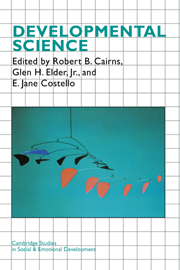Book contents
- Frontmatter
- Contents
- List of Contributors
- Foreword
- Acknowledgments
- Developmental Science:A Collaborative Statement
- 2 Developmental Science: Toward a Unified Framework
- 3 Human Lives in Changing Societies: Life Course and Developmental Insights
- 4 Developmental Psychobiological Theory
- 5 The Question of Continuity and Change in Development
- 6 Primates and Persons: A Comparative Developmental Understanding of Social Organization
- 7 Cognitive Development
- 8 Early Social-Communicative Development: Illustrative Developmental Analyses
- 9 Developmental Psychopathology
- 10 Culture and Cognition in Developmental Perspective
- 11 The Making of Developmental Science
- References
- Author Index
- Subject Index
10 - Culture and Cognition in Developmental Perspective
Published online by Cambridge University Press: 09 November 2009
- Frontmatter
- Contents
- List of Contributors
- Foreword
- Acknowledgments
- Developmental Science:A Collaborative Statement
- 2 Developmental Science: Toward a Unified Framework
- 3 Human Lives in Changing Societies: Life Course and Developmental Insights
- 4 Developmental Psychobiological Theory
- 5 The Question of Continuity and Change in Development
- 6 Primates and Persons: A Comparative Developmental Understanding of Social Organization
- 7 Cognitive Development
- 8 Early Social-Communicative Development: Illustrative Developmental Analyses
- 9 Developmental Psychopathology
- 10 Culture and Cognition in Developmental Perspective
- 11 The Making of Developmental Science
- References
- Author Index
- Subject Index
Summary
In this chapter we focus on the relation between culture and cognition from a developmental perspective, emphasizing learning to read as a way of illustrating the co-constructive nature of development. The ideas expressed in the previous chapters have provided the perfect context within which to provide a developmental approach to this issue. Magnusson and Cairns's first proposition stated, “An individual develops and functions psychologically as an integrated organism. Maturational, experiential, and cultural contributions are fused in ontogeny. Single aspects do not develop and function in isolation, and they should not be divorced from the totality in analysis” (Magnusson & Cairns, Chap. 2). This proposition was illustrated nicely by Gottlieb (Chap. 4), who focused primarily on interactions (or coactions) at the genetic level, but persuasively argued that human functioning cannot be understood without consideration of the complexity of interactions at all levels, from the cellular to the cultural.
In fact, many of the points raised by Gottlieb with reference to geneticorganismic interaction would apply equally to the relation between individuals and culture. For example, his statements, “Genetic activity (expression) can be influenced by events inside and outside the cell, including the environment of the organism” and “Considerable morphological and behavioral ‘evolution’ can occur without changing the genetic composition of an interbreeding population,” could with little difficulty be rewritten to account for the development of individuals in cultures, including change from within the culture and without.
- Type
- Chapter
- Information
- Developmental Science , pp. 190 - 222Publisher: Cambridge University PressPrint publication year: 1996
- 6
- Cited by

